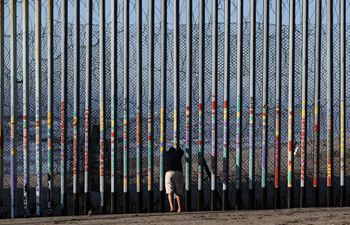
Photo taken on Jan. 5, 2019 shows the White House in Washington D.C., the United States. U.S. President Donald Trump is demanding over 5 billion U.S. dollars in border security to deliver his signature campaign promise to build a wall along the U.S. southern border with Mexico, which has strongly rejected by Democrats. (Xinhua/Liu Jie)
by Matthew Rusling
WASHINGTON, Jan. 11 (Xinhua) -- Saturday is set to mark the longest government shutdown in U.S. history, as the White House and Democrats in Congress remain at odds over the funding of a wall at the border with Mexico proposed by President Donald Trump to fend off immigrants.
Part of the U.S. federal government shuttered since Dec. 22 after the bill funding the government expired and U.S. President Donald Trump vowed to veto any spending bill that does not contain the 5.7 billion U.S. dollars he is demanding to fund a wall on the southern border.
Neither side seems willing to back down. The Democrats accuse the president of using the shutdown and border crisis to score political points, while Trump maintains it's a matter of national security.
FORCED END?
Meanwhile, the White House is weighing the declaration of a national emergency -- a legal mechanism that would allow the president to use the military to build the wall. Experts said such a scenario may well end the government shutdown, although Trump indicated Friday that this would not happen immediately.
"Trump is facing a Democratic majority in the House that has no interest in funding a wall, or anything like a wall that could give Trump a win," said Christopher Galdieri, an assistant professor at Saint Anselm College.
"Trump has decided that it's a wall or nothing, but he has yet to offer House Democrats anything in exchange for it," Galdieri added.
Trump underscored earlier in the week what he said was a "tremendous problem" on the border. "The federal government remains shut down for one reason and one reason only: because Democrats will not fund border security," he said.
House Speaker Nancy Pelosi and Senate Minority Leader Chuck Schumer, both Democrats, made a joint statement earlier in the week accusing the president of "manufacturing a crisis" and calling on him to re-open the government.
NO GUARANTEE
Trump indicated on Friday that the shutdown will continue.
"What we're not looking at doing right now is national emergency. I'm not going to do it so fast," he said.
Republican Strategist and TV news personality Ford O'Connell said the stalemate could well run until the president's State-of-the-Union address in late January. It is possible by then for the president to declare the border crisis a national emergency citing a 1976 act on the proclamation of a national emergency.
"The White House wants to turn the shutdown into a larger argument about border security, and they feel if they can do that they can win," O'Connell said.
Galdieri said, "The path out of this that seems increasingly likely is for Trump to make some sort of emergency declaration and claim that he can now build a wall. But that would set up a lengthy court fight with no guarantee of winning, and that fight could last past the 2020 election."
O'Connell said currently hundreds of miles of the borderland already have some sort of barrier, and noted that Trump merely wants to fund coverage of the last 300 miles of unguarded border territory.
POSSIBLE IMPACTS
Some experts believe the shutdown could take a toll on Trump's popularity.
"So far polling shows the public giving Trump the lion's share of the blame. If that continues, Republicans in Congress are going to have to decide if there's a point at which they break with him," Galdieri said.
"The longer the shutdown goes on, the more uncharted territory we get into," he said.
The scholar said he expects more ripple effects as more and more government services are affected.
"If you have a small town or city where the main driver of the local economy is a factory that makes military equipment or a federal prison or lab and the folks who work there aren't being paid, pretty soon that's going to affect other local businesses -- supermarkets, barber shops, bars, etc," he said.
Others, however, argue that most of the country won't even notice the shutdown, as it's unlikely to impact the majority of Americans.
CAMPAIGN PROMISE
Since his campaign for presidency, Trump has promised to build a wall along the massive U.S.-Mexico border. While many immigrants head to the United States for economic reasons, Trump has argued that drug smugglers and gangs are among those entering the U.S. illegally.
He has vowed to veto any spending bill that does not contain funding for the wall.
Democrats contend that the president wants to gain political favor, and some critics say the president is playing fast and hard with federal workers' wallets.
Many of Trump's core supporters are working-class males who believe that illegal immigration has impacted them negatively. Trump, as part of his campaign, has promised to build a wall and have Mexico pay for it.
There have been nearly two dozen shutdowns since 1976. The last time the country saw such a lengthy shutdown was from Dec. 5, 1995 to Jan. 6, 1996, when then GOP House Speaker Newt Gingrich was at loggerheads with former President Bill Clinton over tax issues.
During the shutdown, a number of departments often do not receive funding until a deal is made. Usually the office won't completely close and a number of staff at departments including the Treasury, Homeland Security and Justice have to work for a time without pay.











